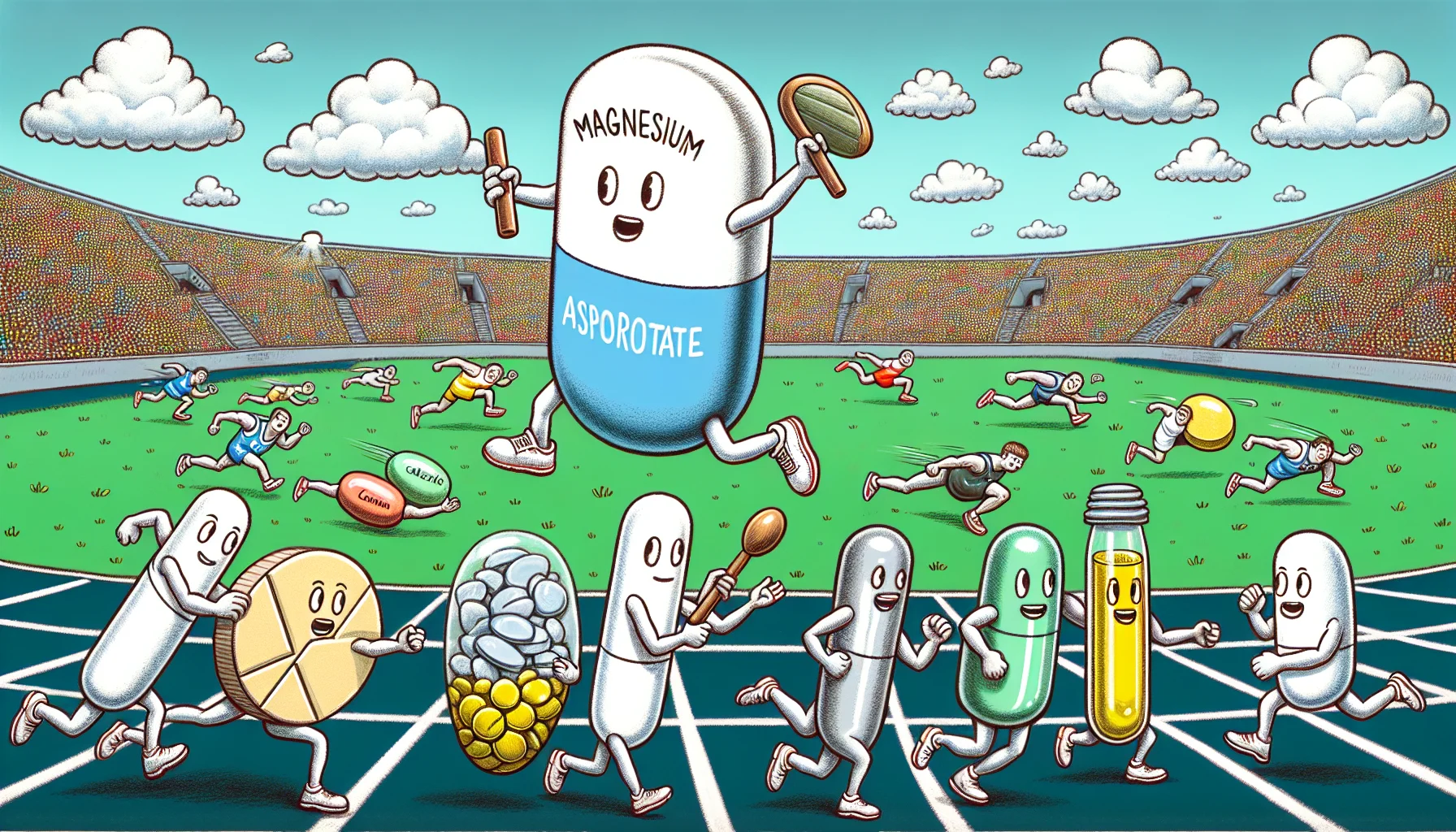Magnesium asporotate Quiz
Test Your Knowledge
Question of
The Benefits of Magnesium Asporotate for Athletes
Magnesium asporotate is a form of magnesium supplement that combines magnesium with aspartic acid, citric acid, and orotic acid. This combination is believed to enhance the absorption and bioavailability of magnesium in the body. Magnesium plays a crucial role in over 300 enzymatic reactions, including those involved in energy production, muscle contraction, and nerve transmission, which are vital for athletic performance. Its enhanced absorption means athletes can more efficiently utilize magnesium for improved energy levels, better endurance, and faster recovery times, making it a valuable supplement for anyone engaged in regular physical activity or sports.
How Magnesium Asporotate Enhances Athletic Performance
Magnesium asporotate plays a pivotal role in the enhancement of athletic performance through its involvement in various physiological processes. It is crucial for muscle function, acting as a cofactor in over 300 enzymatic reactions, including those that produce ATP, the primary energy molecule in the body. This form of magnesium helps in the conversion of glucose into energy, thereby boosting endurance and reducing fatigue. Moreover, it aids in muscle relaxation and contraction, which is essential for preventing cramps and promoting recovery post-exercise. The overall impact of magnesium asporotate on athletic performance is significant, as it not only improves physical performance but also supports metabolic health and muscle recovery, making it a valuable supplement for athletes seeking to optimize their performance.
Optimal Dosage and Timing for Magnesium Asporotate Supplementation
For athletes looking to enhance their performance and recovery, magnesium asporotate can be a beneficial supplement. The recommended dosage typically ranges from 200 to 400 mg per day, depending on individual needs and tolerance levels. It's best taken in divided doses throughout the day to optimize absorption and minimize any potential digestive discomfort. For maximum benefit, taking magnesium asporotate with meals can improve its bioavailability. Evening doses are particularly recommended to support muscle relaxation and improve sleep quality, key components of an athlete's recovery process.
Comparing Magnesium Asporotate with Other Magnesium Supplements
| Type of Magnesium | Bioavailability | Benefits | Specific Uses in Sports |
|---|---|---|---|
| Magnesium Asporotate | High | Supports muscle function, energy production, and cardiovascular health | Reduces muscle cramps and fatigue, enhances recovery |
| Magnesium Citrate | High | Supports metabolism and bone health, aids in relaxation | Helps with hydration and energy production, good for endurance sports |
| Magnesium Oxide | Low | Used for relief of occasional constipation, inexpensive | Limited specific use in sports due to low absorption |
| Magnesium Glycinate | Very High | Supports sleep, stress reduction, and muscle health | Helps with recovery, reduces muscle soreness, and supports sleep quality for athletes |
| Magnesium Chloride | Medium | Improves digestion, kidney function, and detoxification | Used in topical forms for muscle soreness and recovery |
Incorporating Magnesium Asporotate into Your Diet
Food Sources Rich in Magnesium
- Spinach
- Pumpkin seeds
- Almonds
- Black beans
- Avocado
- Dark chocolate
- Bananas
Tips on Including Magnesium Asporotate in an Athlete's Diet
- Start your day with a magnesium-rich breakfast, such as a smoothie containing spinach, banana, and almond milk.
- Incorporate a handful of pumpkin seeds or almonds as a post-workout snack to replenish magnesium levels.
- Add black beans to your salads or rice dishes for a magnesium boost.
- Enjoy dark chocolate as a guilt-free, magnesium-packed treat after dinner.
- Consider magnesium supplements, especially magnesium asporotate, if your dietary intake might not meet your needs. Consult with a healthcare provider to determine the right dosage.
Potential Side Effects and Considerations
Magnesium asporotate supplementation, while beneficial in many aspects, can also lead to certain side effects and requires careful consideration, especially for athletes. Common side effects may include gastrointestinal disturbances such as diarrhea, nausea, and abdominal cramping. In some cases, individuals might experience a laxative effect due to the magnesium content. It's also important to monitor for signs of excessive magnesium intake like muscle weakness, irregular heartbeat, or low blood pressure. Athletes should consider their total dietary magnesium intake and consult with a healthcare professional to ensure the supplement does not interfere with their electrolyte balance or muscle function, which are crucial for optimal performance. Additionally, understanding the timing and dosage that works best in conjunction with their training and recovery phases can help in maximizing the benefits while minimizing potential drawbacks.
Athlete Testimonials on Magnesium Asporotate
Athletes from various sports have shared their experiences with magnesium asporotate, highlighting its significant impact on their training routines, recovery processes, and overall performance. Many have reported enhanced endurance and reduced fatigue during intensive training sessions, attributing these improvements to the supplement's role in muscle function and energy production. Additionally, athletes have noted quicker recovery times and diminished muscle soreness post-exercise, which they believe has helped them maintain a more consistent and rigorous training schedule. The consensus among these testimonials is that magnesium asporotate has become a valuable component of their nutritional regimen, contributing to better athletic performance and well-being.












